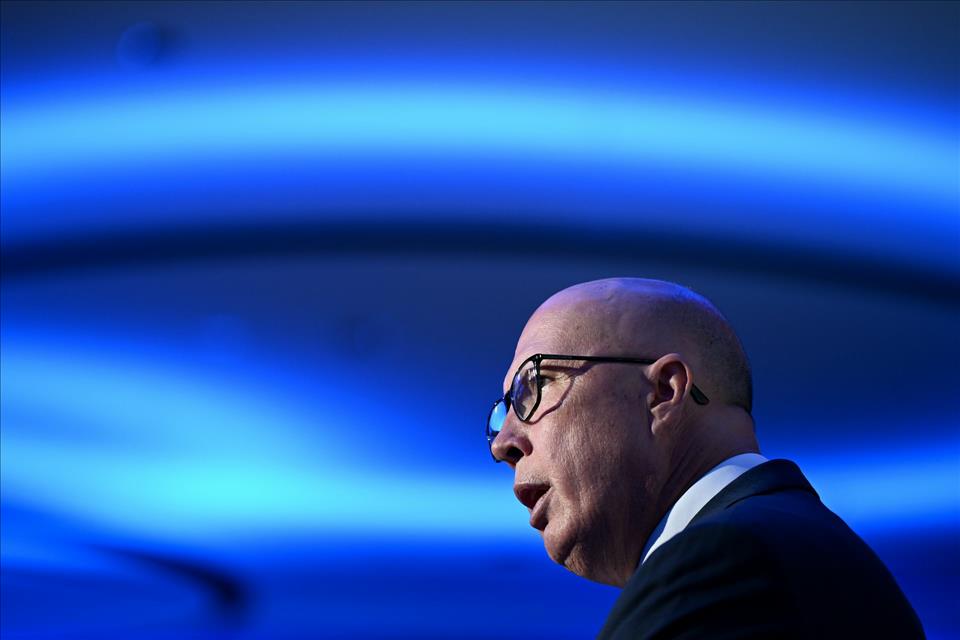
With Its Nuclear Energy Policy, Peter Dutton Seems To Have Forgotten The Liberal Party's Core Beliefs
For Burke, political parties were legitimate when they were based on shared principles and were committed neither to personal nor sectional interest, but to the interest of the nation as a whole.
Recently, Opposition Leader Peter Dutton announced the Coalition would not have an emissions reduction target for 2030. Instead, it would build seven nuclear power plants to reach zero emissions by 2050.
I have spent much of my research life thinking and writing about the Liberal Party and its predecessors, as well its three most successful leaders: Alfred Deakin, Robert Menzies and John Howard. So I have been running Dutton's nuclear policies against my understanding of the Liberal party's core principles.
It's left me puzzled. Setting aside the many technical questions about the cost and feasibility of the plan, the proposal seems to breach some of those core principles.
Public ownership?Political parties change and evolve over time, so it's worth assessing the Liberal Party's current web page for a contemporary statement of beliefs .
As expected, there are clear statements about the party's commitment to maximising private sector initiatives. This includes statements like“government should only do those things the private sector cannot”, and“wherever possible government should not compete with an efficient private sector”.
So why is the Liberal Party proposing to build and own nuclear power plants on sites the government doesn't even own, like Liddell in New South Wales? Or Loy Yang in Victoria where the owner, AGL, has plans already in train to develop low-emission industrial energy hubs?
How would a resort to compulsory acquisition of privately owned sites be justified by a party committed to private enterprise? And what would be the cost of these acquisitions?
Section 51 of the Constitution allows the Commonwealth to acquire property“on just terms from any State or person for any purpose in respect of which the Parliament has power to make laws.” Just terms – that means the property so acquired has to be paid for, by us, the tax payer, and this has to be added to the considerable cost of building the plants.
What about the states?The state premiers of Queensland, NSW and Victoria oppose the plan , as do some Liberal opposition leaders such as Victoria's John Pesutto .
Speaking to the Liberal Party Federal Council in June, Dutton said that the Commonwealth can override state laws , so the state premiers won't be able to stop the plan.
Well it can, but it requires legislation that has to get through a Senate unlikely to be controlled by any future Coalition government. It would also cost a mountain of political capital.
But in terms of principles, how does this sit with the Liberal Party's long-standing support for the rights of the states within the federation? One of the Liberal Party's beliefs is that“responsibility should be divided according to federal principles, without the Commonwealth taking advantage of powers it has acquired other than by referendum.”
National interest or political interest?It seems the policy as announced breaches two of the Liberal party's core principles:
government should not do what is better left to private enterprise the Commonwealth should respect state rightsBut what of the national interest? The Liberal Party has always claimed it is not a sectional party and so is best able to represent the national interest. This, it says, is in contrast to Labor, with its ties to the unionised working class, and the Country Party turned Nationals which represents farmers, the regions, and increasingly, the miners.
What was most shocking about the Coalition's plan is that it blithely flirts with sovereign risk and hence with Australia's national interest. This is completely out of character for the Liberal Party.
Energy infrastructure is a long-term investment. Local and foreign investors are spooked by the collapse of bipartisan commitment to a clean energy transition and reconsidering their investment plans. And if the investment goes, so will the jobs it would have created. How is this in the national interest?
The Coalition has been selling it's nuclear policy to investors. Lukas Coch/AAP
Shadow Minister for Energy Ted O'Brien tried to settle investors down by claiming the Coalition was still committed to renewables as well, but with little detail about the planned mix.
The only one of the Liberal Party's traditional principles visible in this policy is the one that gives the leader, rather than the party, authority over policy.
But where does this leave the Liberals in federal parliament when their leader's policy is so fundamentally at odds with their party's core beliefs? Loyalty to the leader can only go so far. Perhaps Liberal MPs should consult their party's website to remind themselves of the principles on which they stood for election. It seems in the pursuit of winning political points, political principles are all too easy to forget.
-
Nuclear energy
Politics
Energy
Peter Dutton
Society
Political history
Robert Menzies
Energy transition
Australian Liberal Party
Coalition nuclear policy

Legal Disclaimer:
MENAFN provides the
information “as is” without warranty of any kind. We do not accept
any responsibility or liability for the accuracy, content, images,
videos, licenses, completeness, legality, or reliability of the information
contained in this article. If you have any complaints or copyright
issues related to this article, kindly contact the provider above.


















Comments
No comment